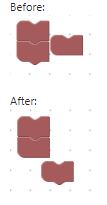One of my goals for this course was to have a bug fix for a project from a big organization. I previously mentioned, I chose to work on a bug from Googly Blockly as it fit the bill, specifically this issue here.
Blockly is used by developers to create Blockly apps. These apps are usually for students or the public to teach coding in a beginner-friendly way.
If the issue with the link didn't provide a good overview here's a quick rundown of the issue. The person filing the bug provided some XML code to load three blocks, one stacked block of two connected blocks and one orphaned block to the right of the stack. The stacked block are pieces that can connect anywhere, whereas the orphaned block is an end piece.
I should technically be able to:
- drag the orphaned block over to the first block in the stack
- the orphaned block should replace the second block on the stack
- the current second block on the stack should be detached from the stack as it cannot connect to the new second block as it is an end piece
This is not happening, instead I am able to only connect the orphaned block to the last block in the stack and instead create a 3 stack block.
I tested each separate block in the stack and can confirm each of them can be connected to the orphaned block individually and this issue is only happening when there is a stack.
A frequent contributor to the project @BeksOmega gave me some pointers on what to look for as the main culprits:
I tested a quick and dirty fix of modifying the return false statement to return true to see if it resolved the issue:
A frequent contributor to the project @BeksOmega gave me some pointers on what to look for as the main culprits:
- a function called showPreview_ displaying a translucent preview of the result if the user was to connect the block
- a function called shouldReplace_ should be called when the user drops the block and blocks connect
- OR none of these functions get called and I have to just trace the call stack and figure out what's wrong
Guess which route I got? I spent a week tracing the call stack and identifying what each function being called did and returned.
Following the whole call stack, I finally found the culprit, the following switch statement:
case Blockly.NEXT_STATEMENT: {
// Don't let a block with no next connection bump other blocks out of the
// stack. But covering up a shadow block or stack of shadow blocks is
// fine. Similarly, replacing a terminal statement with another terminal
// statement is allowed.
if (candidate.isConnected() &&
!this.sourceBlock_.nextConnection &&
!candidate.targetBlock().isShadow() &&
candidate.targetBlock().nextConnection) {
return false;
}Blockly.Connection.prototype.isConnectionAllowed. The comment provided in the code perfectly explains why our orphaned end block was unable to replace the last block on the stack.I tested a quick and dirty fix of modifying the return false statement to return true to see if it resolved the issue:
It worked! However, the quick and dirty fix may cause other issues as there was a case specifically written for this scenario, so this change will probably negatively affect other scenarios. I discussed this with @BeksOmega and asked for her opinion raising my concern and pointing out maybe the behavior which she observed that applied to rows was instead the bug.
A person from Google eventually joined the discussion and we are waiting to hear back from another member until we decide on a way to fix this issue.
For my second internal issue, I decided to write unit tests for the feedparser function I submitted. At the time of my feedparser PR, the project didn't have any testing packages installed yet. It was fun and different as I have never written tests before, it required us to think of tests for not only normal scenarios, but for edge cases as well.
A person from Google eventually joined the discussion and we are waiting to hear back from another member until we decide on a way to fix this issue.
For my second internal issue, I decided to write unit tests for the feedparser function I submitted. At the time of my feedparser PR, the project didn't have any testing packages installed yet. It was fun and different as I have never written tests before, it required us to think of tests for not only normal scenarios, but for edge cases as well.



No comments:
Post a Comment